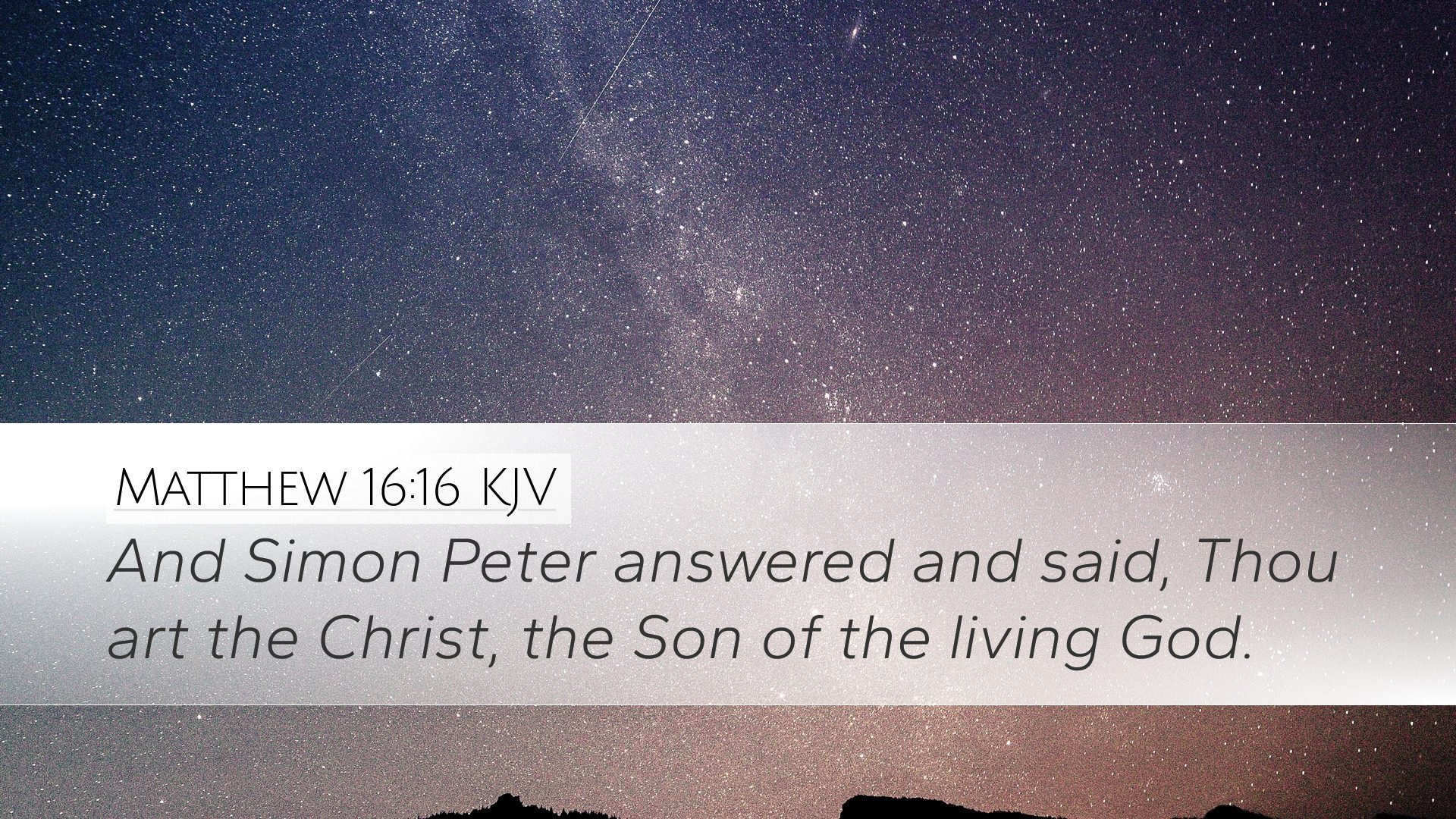Commentary on Matthew 16:16
In Matthew 16:16, Peter makes a profound declaration about the identity of Jesus: "You are the Christ, the Son of the living God." This verse stands as a definitive statement of faith and crystallizes the recognition of Jesus's divine messiahship.
Contextual Understanding
When considering the context, it is crucial to reflect on the preceding passage where Jesus asks His disciples about the opinions the crowds hold concerning His identity (Matthew 16:13). The inquiry sets the stage for Peter's bold proclamation, symbolizing a transition from public opinion to personal conviction.
Peters' Confession: A Theological Insight
From this declaration, we see a twofold understanding of Jesus's nature:
- The Christ: This title, connoting anointed one, holds deep messianic implications. The anticipation of a coming Messiah was ingrained in Jewish thought, encapsulated in prophetic literature.
- The Son of the Living God: This title reveals the uniqueness of Christ's relationship with God the Father, signifying a divine sonship that distinguishes Jesus from all other figures in the biblical narrative.
Commentator Insights
Matthew Henry's Perspective
Matthew Henry emphasizes the significance of Peter's confession as a divinely revealed truth. He asserts that Peter did not arrive at this understanding through human wisdom but through revelation from God: "Flesh and blood hath not revealed it unto thee, but my Father which is in heaven." This highlights the idea that faith in Christ’s identity is a work of divine grace. Henry elaborates on the notion that a true understanding of Christ is foundational to the believer’s journey.
Albert Barnes' Commentary
Albert Barnes delves into the implications of Jesus being the 'Christ,' noting that this word is synonymous with 'Messiah.' In his exposition, he points out that Peter's acknowledgment not only asserts Jesus's messianic office but also implies the fulfillment of Old Testament prophecies. Barnes illustrates that this declaration is both a privilege and a responsibility for believers, as acknowledging Christ's identity invites a life committed to His teachings.
Adam Clarke's Analysis
Adam Clarke provides a profound insight into the phrase "living God." He notes the importance of contrasting the Living God with the idols of the time, emphasizing that while false gods are lifeless, the God of Israel is active, present, and engaging with humanity. This contrast serves to elevate the status of Christ, who embodies the perfection and reality of the Living God.
Implications for Doctrine
This declaration serves as a cornerstone for Christian doctrine. It affirms the dual nature of Christ—both human and divine, which is central to Christological discussions. The acknowledgment of Jesus as 'the Christ' leads to the understanding that He fulfills all prophecies and typologies found throughout Scripture.
Application for Believers
The exhortation to recognize and proclaim Jesus as the Christ must resonate within the church today. Just as Peter's declaration was pivotal for the early disciples, it must serve a similar purpose in believers' lives now. The implications are profound:
- Faith's Foundation: Understanding Christ's identity as the Messiah shapes our faith and informs our relationship with God.
- Commitment to Discipleship: With recognition comes responsibility, urging believers to live out their faith in action and witness.
- Assurance of Salvation: Recognizing Jesus as our Savior reassures us of the eternal life promised in Him.
Conclusion
Matthew 16:16 is not merely a statement about Jesus; it is an invitation into a deeper relationship with Him. As pastors, scholars, and students of the Word engage with this text, the call remains clear: to recognize Christ as the living Messiah and respond to that revelation with faith and action.


